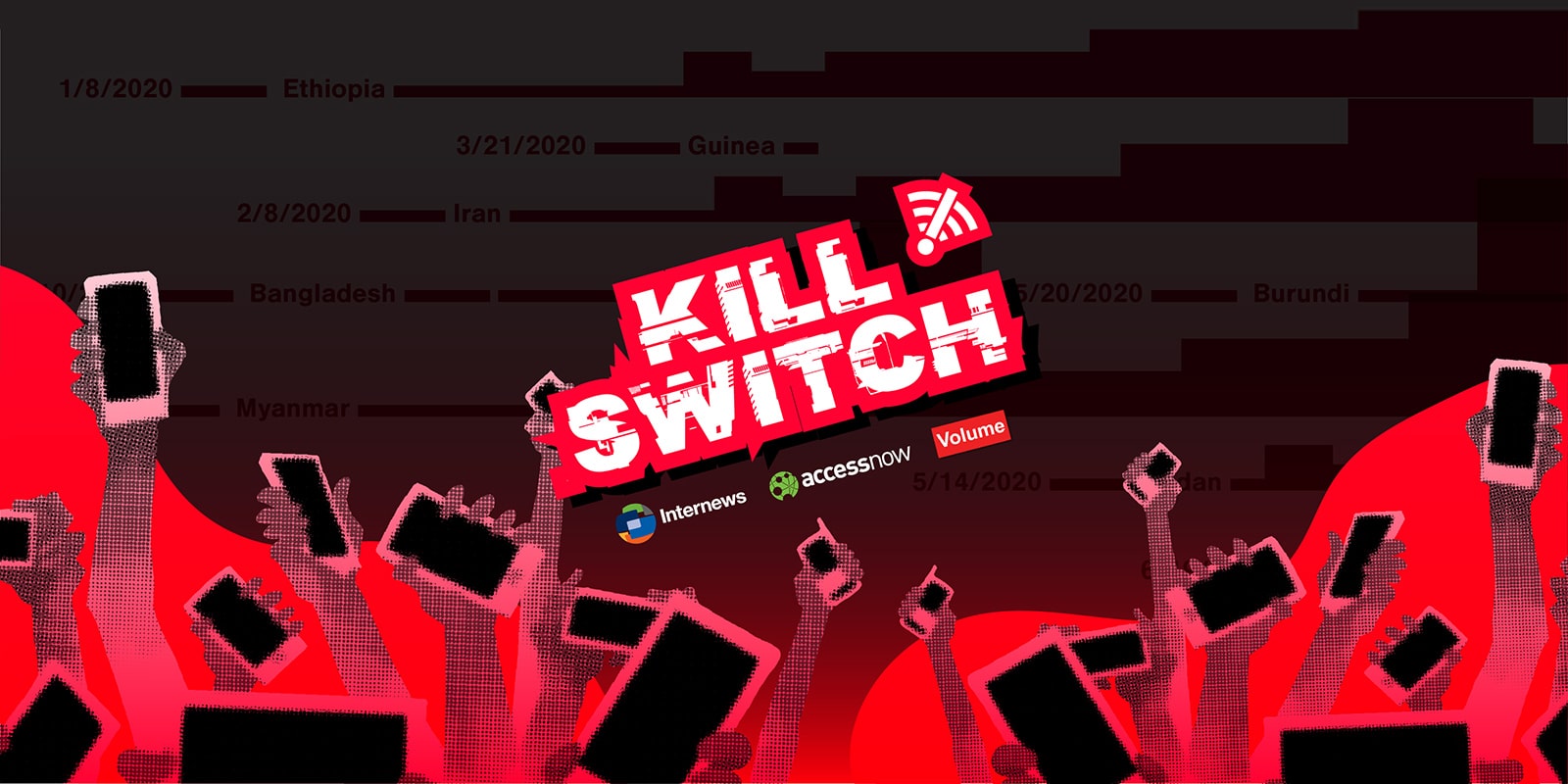Around the world, governments are increasingly ordering internet shutdowns to quell protests, silence vulnerable groups, and suppress dissenting voices. They’re deliberately cutting off internet access, slowing connections, or blocking sites and services during elections, mass demonstrations, and other critically important events. And they won’t stop, even as the spread of COVID-19 makes internet connectivity essential for our health and safety. As this new form of anti-democratic repression spreads across the globe, it is disrupting lives, costing us financially, and limiting our ability to stay healthy, work, and express ourselves.
So why aren’t internet shutdowns illegal? Are there ways to bypass them? Can we fight internet shutdowns in court? Does anyone see a way to end shutdowns, once and for all?
To help answer these questions, Access Now and the #KeepItOn coalition, in collaboration with Volume, created the Kill Switch podcast. We talk to the people affected by shutdowns and experts from across the globe to explore the impact internet shutdowns have on our lives, the strategies for fighting them in court, the tools for bypassing blocks and censorship, and the pathway ahead for navigating, circumventing, and ultimately ending government use of the kill switch — for good.
What can we do when governments use internet shutdowns in attempts to quell protests, muzzle dissidents, hinder journalists, and silence political opposition during elections and other important national events? From Ethiopia to Pakistan, to India and Myanmar, we hear from human rights activists working diligently to hold their leaders accountable for flipping the kill switch.Featuring: Hija Kamran (Media Matters for Democracy, Pakistan), Mishi Choudhary (Software Freedom Law Center), Oliver Spencer (Free Expression Myanmar), and Berhan Taye (Access Now).
Can you challenge your government in court over a shutdown and demand your “right” to internet access? What if the courts are biased? What threats should you anticipate for taking such a bold step? In a deep-dive exploration of cases from Togo and Indonesia, where courts have ruled in favor of digital rights and denounced internet shutdowns, we talk about what people challenging shutdowns have experienced, and the techniques lawyers and free expression experts are using to achieve victory.Featuring: Shahad Azim (Sudanese Lawyer,South Africa), Damar Juniarto (Southeast Asia Freedom of Expression Network), and Natalia Krapiva (Access Now).
What can you do if — without any warning — government authorities block access to email and social media? How do you stay connected to family and friends, find out what is going on, or get access to life-saving health information? Through a conversation with individuals living in Cox’s Bazar refugee camp in Bangladesh, in Buea, the Anglophone region of Cameroon, in Delhi in India, and in Monrovia in Liberia, you’ll hear about how internet shutdowns are disrupting people’s work, life, and education — and putting their lives at stake during the COVID-19 pandemic. Our guests demonstrate the determination and resilience that people around the world are showing as they fight shutdowns and defend human rights in the digital age.Featuring: Ro Sawyeddollah (displaced Rohingya in Cox’s Bazar Refugee Camp, Bangladesh), Mambe Churchill Nanje (Njorku), Devdutta Mukhopadhyay (Internet Freedom Foundation), and Ruth Gbatoe (Center for Media Studies and Peacebuilding).
Do you have to be a tech wizard to bypass an internet shutdown? How can everyday citizens get back online? We break down the technical side of internet shutdowns, and provide information on the tools you can use to circumvent blocking of sites and services. We also talk about ways you can verify whether your government is slowing down internet access or censoring certain sites, and explain how this supports efforts to advocate against shutdowns. You’ll find out what’s been happening in Venezuela, and learn about the frighteningly sophisticated tactics that Iran’s government is using to shut down the internet — and the innovative techniques people are using to circumvent them.Featuring: Hassen Selmi (Access Now’s Digital Security Helpline), Maria Xynou (Open Observatory of Network Interference), Andrés E. Azpúrua (Venezuela Inteligente), and Amir Rashidi (Internet Security and Digital Rights Researcher).
How do internet shutdowns impact human rights? Is internet access a human right? If there’s no internet access, how do we document and share information about human rights violations — such as during crackdowns on protests — with the rest of the world? We speak to a journalist, an activist, and a human rights researcher about the ways internet shutdowns and human rights violations intersect, and the strategies human rights advocates are using to document and report on rights violations under the shadow of internet blackouts around the globe.Featuring: Fisseha Tekle (Amnesty International, Ethiopia), Yvonne Ng (Witness), and Tom Gardner (The Economist).
Will internet shutdowns continue to spread across the world? What can we do to stop them? Is there any hope of preventing shutdowns from becoming a new international norm? How far are we on the path toward banning them globally as a human rights violation? As we look to the future, we explore the avenues at national, regional, and international levels to advance the ongoing fight against internet shutdowns.Featuring: Julie Owono (Internet Sans Frontières), Mohammed Sharief (Zain Sudan), Derek Barnabas Laryea (Ghana Chamber of Telecommunications), and Laura O’Brien (Access Now).
About the podcast: Kill Switch is a six-part podcast that seeks to highlight the troubling rise of government-ordered internet shutdowns around the world and the strategies human rights advocates are using to push back against these new acts of repression. Kill Switch is brought to you by Access Now and the #KeepItOn coalition with funding support from Internews (@Internews). It is produced by Volume (@VolumeAfrica) and hosted by Felicia Anthonio (@FelAnthonio), Campaigner, #KeepItOn Lead at Access Now. Production assistance by internet teapot. Music by Oman Morí.You can access all the episodes of Kill Switch on Apple Podcasts, Spotify, and Google Podcasts, as well as the Access Now YouTube channel.
